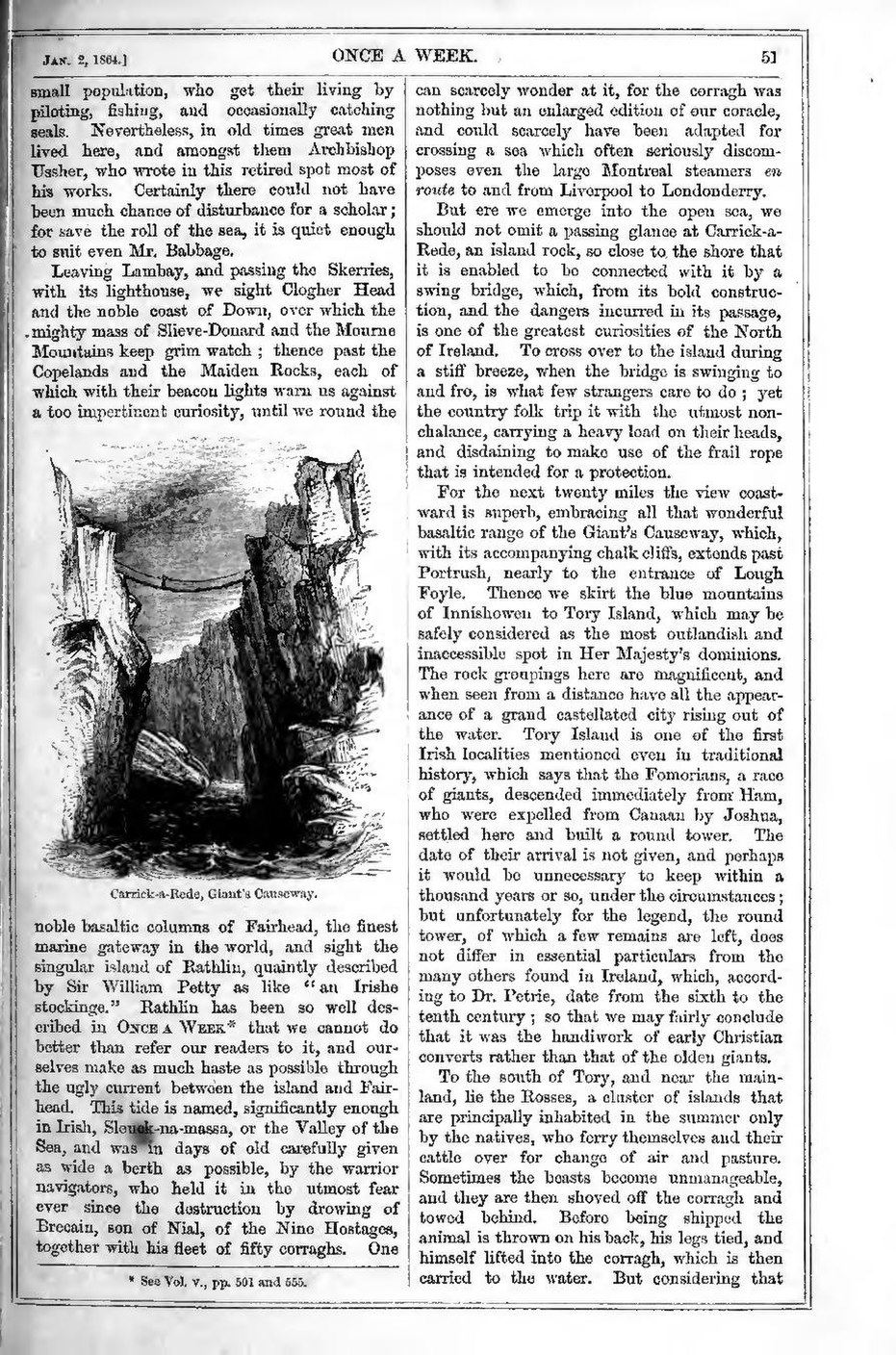Jaw. miiiall
ONCE A WEEK.
2,
population,
who
their
get
living
can scarcely wonder at it, for the corragh was nothing but an enlarged edition of our coracle, and could scarcely have been adapted for crossing a sea which often seriously discomposes even the large Montreal steamers en
by
and
occasionally catching Nevertheless, in old times great men ishing,
ed
here,
ssher, is
works.
been
and
who wrote
amongst them
Archbishop most of could not have
in this retired spot
Certainly there of disturbance for a scholar
much chance
for save the roll of the sea,
it is
route to and from Liverpool to Londonderry. But ere we emerge into the open sea, we should not omit a passing glance at Carrick-a-
quiet enough
Mr. Babbage. Leaving Lambay, and passing the
51
Rede, an island rock, so close to the shore that is enabled to be connected with it by a swing bridge, which, from its bold construc-
to suit even
it
Skerries,
with its lighthouse, we sight Clogher Head and the noble coast of Down, over which the mighty mass of Slieve-Donard and the Mourne thence past the Mountains keep grim watch Copelands and the Maiden Rocks, each of which with their beacon lights warn us against a too impertinent curiosity, until we round the
and the dangers incurred in its passage, one of the greatest curiosities of the North of Ireland. To cross over to the island during a stiff breeze, when the bridge is swinging to and fro, is what few strangers care to do yet the country folk trip it with the utmost non-
tion, is
chalance, carrying a heavy load on their heads, and disdaining to make use of the frail rope
that
is
intended for a protection.
For the next twenty miles the view coastward is superb, embracing all that wonderful basaltic range of the Giant's
with
its
accompanying chalk
Causeway, which, extends past
cliffs,
nearly to the entrance of Lough Thence we skirt the blue mountains Foyle. of Innishowen to Tory Island, which may be
Portrush,
safely considered as the most outlandish and noble spot in Her Majesty's dominions.
The rock groupings here are magnificent, and when seen from a distance have all the appearance of a grand castellated city rising out of the water. Tory Island is one of the first Irish localities mentioned even in traditional
which says that the Fomorians, a race of giants, descended immediately from Ham,
history,
who were
expelled from Canaan by Joshua, here and built a round tower, The date of their arrival is not given, and perhaps
settled
would be unnecessary to keep within a thousand years or so, under the circumstances but unfortunately for the legend, the round tower, of which a few remains are left, does not differ in essential particulars from the many others found in Ireland, which, according to Dr. Petrie, date from the sixth to the tenth century so that we may fiirly conclude that it was the handiwork of early Christian converts rather than that of the olden giants. To the south of Tory, and near the mainit
Carriek-.i-Rcdo, Giunt'a Cau
noble basaltic columns of Fairhead, the finest marine gateway in the world, and sight the singular island of Rathlin, quaintly described
by
Sir
William
Petty as like
" an
Irishe
Rathlin has been so well desstockinge." cribed in Once a Week * that we cannot do better than refer our readers to
it,
and our-
much
haste as possible through the ugly current between the island and Fairhead. This tide is named, significantly enough uiake as
in Irish, SleiMk-na-massa, or the Valley of the
m
Sea, and was as wide a berth
days of old carefully given as possible, by the warrior navigators, who held it in the utmost fear ever since the destruction by drowing of Brecain, son of Nial, of the Nine Hostages, together with his fleet of fifty corraghs. !.
v.,
pp. 501
One
[
land, lie the Rosses, a cluster of islands that are principally inhabited in the summer only
by the cattle
natives, who ferry themselves and their for change of air and pasture.
over
Sometimes the beasts become unmanageable, and they are then shoved off the corragh and towed behind. Before being shipped the animal is thrown on his back, his legs tied, and himself lifted into the corragh, which is then carried
to the water.
But considering that